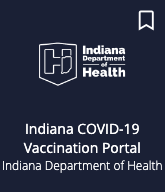to view in other languages.
Deslice hasta la parte inferior para usar
el Traductor de Google y ver en otros idiomas.
COVID-19 Prevention
There are precautions you can take to prevent serious illness from COVID-19. The safe and effective vaccine is the best way to build protection.
The U.S. Food and Drug Administration (FDA) has approved and authorized an updated Moderna, Pfizer and Novavax 2023-2024 COVID-19 vaccine. The Centers for Disease Control and Prevention (CDC) also recommends everyone 6 months and older get an updated COVID-19 vaccine to protect against the potentially serious outcomes of COVID-19 illness.
Adults ages 65 and older can now to receive an additional updated 2023-2024 COVID-19 vaccine dose as long as four months have passed since their last dose. Adults in this age range are at greater risk for severe outcomes of COVID-19, and an additional dose of the updated COVID-19 vaccine may restore protection that has waned since a fall vaccine dose.
The updated mRNA vaccines are designed to include a single component that is effective against the current COVID-19 variant. A new CDC report finds that the updated 2023-2024 COVID-19 vaccines cut the risk in half for visiting the emergency department, urgent care or being hospitalized with COVID-19 for most people. Please visit vaccines.gov to find a vaccination site near you.
For people with health insurance, most plans will cover COVID-19 vaccine at no cost to you. People who don’t have health insurance or with health plans that do not cover the cost may get a free vaccine from their healthcare provider, local health department and pharmacies participating in the CDC’s Bridge Access Program. Children eligible for the Vaccines for Children program also may receive the vaccine from a provider enrolled in that program.
More information on staying up to date with COVID-19 is available here.
You can also help protect yourself and others by improving ventilation and following respiratory virus guidance.
Other measures to help prevent you from breathing in virus particles include wearing a mask or increasing the space from other people. Learn more on about how to protect yourself against infection.
Have a question about COVID-19 vaccine? Search our Frequently Asked Questions.
To filter the FAQ lists below, please type in a keyword or phrase in the search field. Once you start typing the lists below will show only relevant results.
Sign Up, Scheduling and Vaccination Card
Safety and Efficacy
COVID-19 Infection, Exposure and Treatment
About the vaccine
The Moderna, Novavax and Pfizer vaccines are approved for individuals 12 years of age and older and are authorized under emergency use for individuals 6 months through 11 years of age. The bivalent vaccines are no longer authorized for use in the United States.
Pfizer-BioNTech, Moderna and Novavax vaccines have received Emergency Use Authorization (EUA). The EUA process has allowed for clinical trials and manufacturing to occur simultaneously, while still allowing for rigorous testing to determine how safe and effective it is. COVID-19 vaccines are the most tested and monitored vaccines in U.S. history.
Safety is top priority.
The first goal is to focus on the safety of the vaccine and determining how effective it is. Before any vaccine is released, it must first complete three phases of clinical trials to study its effect on thousands of diverse study participants. Once that study is done, the pharmaceutical company submits the results for Emergency Use Authorization (EUA) from the U.S. FDA. This is a way to make important health breakthroughs available to the public quickly.
The vaccine is then reviewed by the Centers for Disease Control and Prevention’s Advisory Committee on Immunization Practices (ACIP). ACIP is a federal advisory committee of medical and public health experts who develop recommendations on the use of vaccines in the U.S. public.


